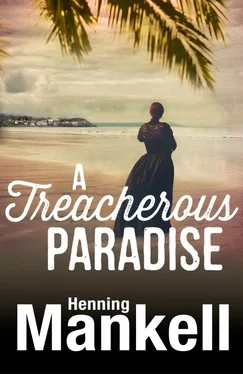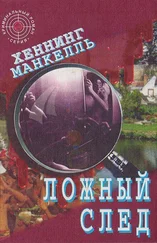She held out her hand and let the rain patter on to her skin.
I must go home, she thought again. I can’t cope with living here, surrounded by all this fear and a loneliness that is threatening to suffocate me.
She remained standing by the window until the heavy but short-lived rain had stopped. She closed the curtain and went back to bed, still without covering herself with the blanket.
The following day, and for many days to come, she went down to the harbour to see if a ship flying the Swedish flag had berthed by a quay or was waiting in the roadstead. Judas always accompanied her, keeping watch in silence a few paces behind her.
It is October, 1904. She is waiting.
The piano Tuner’s name was José, but he was never called anything but Zé, and he was Senhor Vaz’s brother. That was a discovery she made after having lived for quite a long time in the brothel. No matter how much she studied the two men, she couldn’t see any similarities. But Zé assured her there was no doubt at all that they had the same parents. Even though she soon gathered that Zé was somewhat mentally challenged, she had no reason to doubt him on this point. And why would Senhor Vaz allow him to sit there tuning the piano day after day unless there was some special reason? Senhor Vaz was looking after his brother because their parents had passed away.
In a word, Senhor Vaz loved him. Hanna noted the touching solicitude with which he treated his brother. If any of the clients complained about the constant tuning of the piano, she witnessed with her own eyes how Senhor Vaz would order the man out of the building and would never allow him back in. Zé had permission to tune the piano or polish the keys as often and for as long as he wanted.
But there were exceptions, of course. When the brothel was visited by prominent men from South Africa, leading figures in the government or the church, Vaz would lead his brother gently to the room behind the kitchen where Zé had his bed. The beautiful Belinda Bonita, who was always well informed about everything that went on in the brothel, told Hanna that there was also an old piano in that room. The keys were still there, but all the instrument’s strings had been cut and removed.
So Zé would sit in his room, tuning a silent piano.
Zé lived in a world of his own. He was a few years older than his brother, seldom spoke unless he was spoken to, tuned his strings or merely sat quietly hunched over the piano as if he were waiting for something that was never going to happen. He was like a ticking clock, Hanna thought, with nothing happening to interrupt the regular rhythm.
But that wasn’t completely true, she realized one day when she had been living in the brothel for nearly four months. As usual she had strolled down to the harbour together with her gigantic bodyguard, and looked to see if she could find a ship flying the Swedish flag: but there was none to be seen on this occasion either. She had bought a pair of binoculars from an Indian businessman who also sold cameras and spectacles. Thanks to the magnified images she was able to establish that none of the ships waiting in the roadstead was displaying a Swedish flag. Every time she returned to the hotel she did so with mixed feelings of disappointment and relief. Disappointment because she really did want to return home, relief because she dreaded ever having to board a ship again.
The moment she entered O Paraiso she could see that Zé wasn’t in his usual place at the piano. But she didn’t have time to ask where he was before he made his grand entry. The women who had been lounging around on the sofas or leaning over the billiard table patting balls back and forth with rather silly flourishes of the hand burst out laughing but also applauded him when he appeared. He had changed out of his usual crumpled dark suit into a white one. Instead of the usual dirty beret pulled down over the back of his head, Zé was now wearing a panama hat similar to the one his brother usually wore. In addition he had a white shirt with a high collar and a black cravat, elaborately tied. In one hand he was carrying a bunch of white paper flowers. He stood in front of the woman whose name was Deolinda, but who was never called anything other than A Magrinha, since she was so thin, flat-breasted and totally lacking in the usual female characteristics.
Hanna had sometimes looked at her and wondered how on earth she could attract a man. She preferred not to think that thought through to its logical conclusion, but she couldn’t avoid it: Deolinda was ugly. It seemed to Hanna that the whole of her emaciated person radiated sorrow and suffering. But she did have clients, Hanna knew that: she had seen them going with Deolinda. She found it totally repulsive to imagine A Magrinha in bed with one of the white men who patronized the brothel; but she evidently had something that enticed them and aroused their desires.
Zé bowed and handed over his paper flowers. Deolinda stood up, took him by the arm and led him to her room in the corridor where clients were entertained. They were sent on their way by merry laughter and renewed applause before the room was once again characterized by apathetic idleness.
There were always a few hours in the late afternoon when nothing really happened in the brothel. Clients rarely if ever appeared. The women dozed off, painted their nails, or possibly exchanged a few whispered confidences.
None of the black women apart from Felicia ever spoke to Hanna unless she asked them a question or requested something. Senhor Vaz had made it clear to her that the women in his establishment were there not only to satisfy their clients, but that they were also supposed to serve the hotel guests. She still didn’t know how they regarded her: they greeted her, smiled at her, but never attempted to be friendly with her. And she didn’t know what was meant by their being ‘supposed to serve the hotel guests’. After all, she was the only person renting a room.
She sat down at the end of a sofa next to Esmeralda, who was one of the oldest of the women, with a bird-like face and the longest fingers Hanna had ever seen.
Silence descended on the room. Hanna realized that this was the first time she had ever sat down next to one of the black women.
She pointed at the corridor into which Deolinda and Zé had just disappeared.
‘A pair of lovers?’ she asked.
Esmeralda nodded.
‘Yes, they are a pair of lovers,’ she said. ‘He sometimes gets that feeling. Then he forgets his piano. It happens every other month or so. He changes his clothes, and it is always Deolinda he chooses.’
Hanna wanted to ask more questions, not least to make sure that she had understood properly: but Esmeralda stood up in an impressively dignified fashion. As far as she was concerned the conversation was at an end. She glided away to her room, her hips swaying attractively.
Hanna also rose to her feet and went up the stairs. She didn’t need to turn round to know that all the nine women left down below were watching her attentively. They look at us when we turn our backs on them, she thought. They are not afraid to look each other in the eye; but they are afraid of our eyes just as we are afraid of theirs.
She closed the door behind her, bolted it, and undressed from the waist up. She washed herself in cold water, using a linen cloth. She licked one of her lower arms and could taste all the salt from the perspiration that had been pouring off her. Then she lay down on the bed and closed her eyes. But she sat up again almost immediately. She had remembered something she hadn’t thought about since she left Sweden on the ship which must have long since docked in Australia with its cargo of timber.
She dug out the hymn book with the golden embossing in which she had hidden the gold coins she had once been given by Forsman. Between the pages was also a black and white photograph. It was of Berta and herself, taken in Bernard Dunn’s photo-studio in Sundsvall.
Читать дальше












